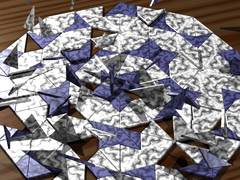


This work is licensed under a Creative Commons Attribution-Noncommercial-Share Alike 3.0 Unported License.




musesti@dmf.unicatt.it)paolini@dmf.unicatt.it)In a periodic tessellation there is a region that repeats itself by translations. Mathematicians discovered that there are exactly 17 different kinds of periodic tessellations (the well known tessellations that cover the Alhambra walls in Granada contain examples of each of the existing 17 structures).
On the contrary the Penrose tessellation is a nonperiodic way to fill the plane, therefore there is no region that continually repeats itself. In a sense one could say that the Penrose tessellation is very varied, never repeating itself. To construct it, we use two forms: darts (dark colored tiles) and kites (light colored tiles). The fascinating thing is that the Penrose tessellation is not only non-periodic, but there is no way to place the tiles in a periodic way: like the pieces of a jigsaw puzzle, the way to fit darts and kites invariably leads to a non-periodic tessellation of the plane.
This short movie (16 minutes long) explains the construction of the Penrose tessellation and shows some of its properties.
EXTRA of the DVD, which can be viewed on a PC,
contains the movie in a higher resolution and some additional material.
The website www.jamendo.com has a huge collection of free music (usually published under Creative Commons license, the same of this DVD).
 On that website we found the Ambient Symphony album
by zero-project,
from which we took the songs for the current soundtrack.
On that website we found the Ambient Symphony album
by zero-project,
from which we took the songs for the current soundtrack.

You can contact them by email:
paolini@dmf.unicatt.it
musesti@dmf.unicatt.it